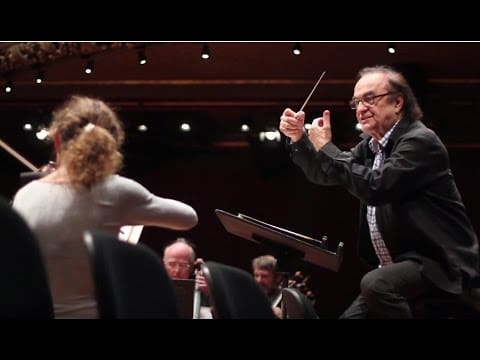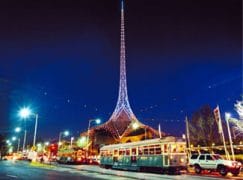Tom Scharfeld created an iPhone app designed to teach people how to play the trumpet.
He called it iTrump.
Lawyers for Donald Trump launched a battle to claim ownership of the app name.
They lost.
Read here on Bloomberg.

Tom Scharfeld created an iPhone app designed to teach people how to play the trumpet.
He called it iTrump.
Lawyers for Donald Trump launched a battle to claim ownership of the app name.
They lost.
Read here on Bloomberg.

Alexander Steinhilber, managing director of the Leipzig Bach Archive has submitted his resignation, giving two weeks notice.
He cites personal reasons for leaving the plum post which he only took up 18 months ago.
The President of the Bach Archive is the British conductor, Sir John Eliot Gardiner.

A petition has been posed calling on the Venezuelan government to release the violinist Wuilly Arteaga, 23, who has been held without charge and brutally treated for the past two weeks.
The first beating actually damaged his hearing.
Wuilly’s only offence has been to play in protests against the regime.
Sign here.

The Swiss conductor will be awarded the Royal Philharmonic Society’s gold medal at the BBC Proms this week.
press release:
One of classical music’s highest honours, the Royal Philharmonic Society Gold Medal, has been awarded to the Swiss conductor Charles Dutoit. He becomes the 103rd recipient since the medal was founded in 1870 in celebration of the centenary of the birth of Beethoven (London’s Philharmonic Society commissioned Beethoven’s Ninth Symphony and enjoyed a close association with the composer).
The medal will be presented to Charles Dutoit at the BBC Proms, on Thursday 17 August as part of a concert at the Royal Albert Hall (and live on BBC Radio 3) by the Royal Philharmonic Orchestra.* Charles Dutoit is Artistic Director and Principal Conductor of the Royal Philharmonic Orchestra, and conducts a programme that includes Saint-Saën’s 3rd Symphony, commissioned by the Philharmonic Society in 1886.
Current RPS Gold Medallists include Martha Argerich, Janet Baker, Daniel Barenboim, Alfred Brendel, Placido Domingo, Bernard Haitink, György Kurtag, Antonio Pappano, Thomas Quasthoff, Simon Rattle, András Schiff, John Tomlinson and Mitsuko Uchida.
Distinguished conductors previously awarded the RPS Gold Medal include: Thomas Beecham; Bruno Walter; Arturo Toscanini; Felix Weingartner; Adrian Boult; John Barbirolli; Herbert von Karajan; Leonard Bernstein; Georg Solti; Colin Davis; Pierre Boulez; Claudio Abbado; Charles Mackerras and Nikolaus Harnoncourt.

The future Glenn Gould royalties, as well as the rights to his name and image, have been sold to Primary Wave Entertainment, a US agency that squeezes artists’ reputations to the last drop. Story here.
The don’t own this.

photo (c) Don Hunstein/Lebrecht Music&Arts
The Telegraph has picked up the St-Sep’s scandal from Slipped Disc and gone to church composer John Rutter for comment.
Rutter says: ‘What this current vicar seems to be saying is that music is OK so long as it’s part of a worship service. The concerts that take place in just about every church in the land, they’re not OK, and rehearsals are not OK either.
‘That flies in the face of the Anglican tradition.
‘I know Richard Chartres was a great friend of music and he would have been the first to say ‘come on’. But he is gone and so there’s nobody else.’

A sorry state of affairs.
Michael Shmith, a star of The Age newspaper in Melbourne for 36 years, has resigned as its opera critic because the paper no longer allocates space to the art form.
Michael writes:
In early August, I resigned as The Age’s opera critic. I didn’t particularly want to do so, and my decision was neither pre-emptory nor forced upon me. I left because of the sad but inevitable realisation that The Age’s arts page no longer truly represented or upheld the critical standards that were once imperative to its existence and whose values remain of vital concern to me. And when I say ‘me’, I mean, by default, the artform I had the privilege to review.
Opera is but one of the many artforms under review in The Age(that proud title long ago consumed in the swirling smog of something called Fairfax Media). But arts space has shrunk to the point where there is often just the one page Monday to Friday, with no page on Saturday, and an inordinate amount of copy to run. If you equate the exponential with the extant – the ever-increasing number of performances, exhibitions, and other cultural events in this city juxtaposed with the dwindling budgets (particularly for freelance writers) and forever-shrinking space available in which to publish reviews – it is easy to see how the arts editor’s role has metamorphosed from being able to exercise reasonable judgement in what to run to more drastic, slash-and-burn decision-making.
So it came to pass with opera reviewing for The Age.
On a personal note, I remember when Michael, as arts editor of The Age, used to publish my columns from the northern hemisphere because he believed – rightly, at the time – that Melburnians needed and wanted to know what was going on in the world beyond their horizons. My mailbag was full of intelligent responses. The Age was a serious paper with a serious purpose. No longer, it seems.
